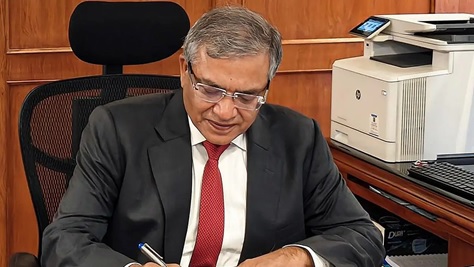Why in news?
Current Election Commissioner Gyanesh Kumar has been appointed as the new Chief Election Commissioner (CEC).

Key Points:
- Gyanesh Kumar is a 1988 batch IAS officer.
- Current CEC Rajiv Kumar is retiring today.
- Gyanesh Kumar is the first CEC to be appointed under the new law.
- His term will be till 26 January 2029.
- The appointment was decided in a meeting led by Prime Minister Narendra Modi.
- Home Minister Amit Shah and Leader of Opposition in Lok Sabha Rahul Gandhi attended the meeting.
- Vivek Joshi has been appointed as Election Commissioner in the meeting.
- He is the Chief Secretary of Haryana and a 1989 batch IAS officer.
- Election Commissioner Sukhbir Singh Sandhu will continue in his post.
Election Commission of India:
- It is an independent and constitutional body, which conducts free, fair and transparent elections in the country.
- Its provision is mainly made in Article 324 of the Constitution.
- It was established on January 25, 1950 according to the Constitution.
- This date is celebrated as National Voter's Day.
Structure of Election Commission:
- The Election Commission of India has three main officials:
- Chief Election Commissioner (CEC)
- Two Election Commissioners (Election Commissioners - ECs)
- Earlier this commission was one-member, but in 1993 it was permanently made a three-member.
Appointment:
- The President appoints the Election Commissioners.
- A committee consisting of the Prime Minister, Home Minister and the Leader of the Opposition in the Lok Sabha recommends it.
Tenure:
- The tenure of the Election Commissioner is 6 years or till the age of 65 years (whichever is earlier).
- The salary and facilities of the CEC and Election Commissioners are equal to that of a Supreme Court judge.
Powers and responsibilities of the Election Commission:
- Article 324 gives the Election Commission the responsibility to conduct free and fair elections.
- Some of its major powers and functions include:
- Conduct of elections to the Lok Sabha, Rajya Sabha and Legislative Assemblies.
- Conduct of elections to the President and Vice President.
- Granting recognition to political parties and allotment of election symbols.
- Preparation and monitoring of voter list.
- Enforcing the Model Code of Conduct.
- Resolving disputes related to the electoral process.



